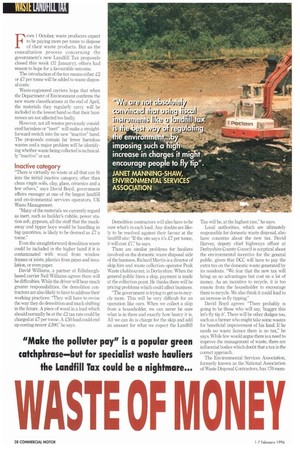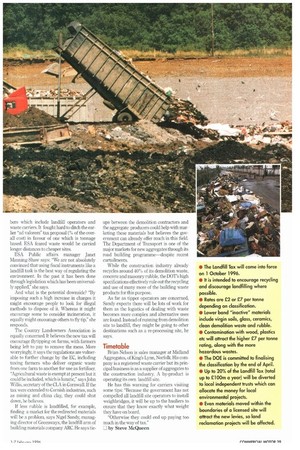WASTE OF MONEY
Page 40

Page 41

If you've noticed an error in this article please click here to report it so we can fix it.
the Landfill Tax could be a nightmare... "Make the polluter pay" is a popular green catchphrase—but for specialist waste hauliers
From 1 October, waste producers expect to be paying more per tonne to dispose of their waste products. But as the consultation process concerning the government's new Landfill Tax proposals closed this week (31 January), others had reason to hope for a favourable outcome.
The introduction of the tax means either £2 or £7 per tonne will be added to waste disposal costs.
Waste-registered carriers hope that when the Department of Environment confirms the new waste classifications at the end of April, the materials they regularly carry will be included in the lowest band so that their businesses are not affected too badly.
However, not all wastes previously considered harmless or "inert" will make a straightforward switch into the new "inactive" band. The proposals contain far fewer harmless wastes and a major problem will be identifying whether waste being collected is technically "inactive" or not.
Inactive category
'There is virtually no waste at all that can fit into the initial inactive category, other than clean virgin soils, clay, glass, ceramics and a few others," says David Boyd, government affairs manager at one of the largest landfill and environmental services operators, UK Waste Management.
"Many of the materials we currently regard as inert, such as builder's rubble, power station ash, gypsum, all the stuff that the muckaway and tipper boys would be handling in big quantities, is likely to be deemed as .C7 a tonne."
Even the straightforward demolition waste could be included in the higher band if it is contaminated with wood from window frames or joists, plastics from pipes and insulation, or even paper.
David Williams, a partner at Edinburghbased carrier Neil Williams agrees there will be difficulties. While the driver will bear much greater responsibilities, the demolition contractors are also likely to have to address their working practices: "They will have to revise the way they do demolition and muck shifting in the future. A piece of wood in a load which should normally be at the £2 tax rate could be charged at £7 per tonne. A £50 load could end up costing nearer£200," he says.
Demolition contractors will also have to be sure what's in each load. Any doubts are likely to be resolved against their favour at the landfill site: "If the site says it's £7 per tonne, it will cost .£7:' he says.
There are similar problems for hauliers involved on the domestic waste disposal side of the business. Richard Martin is a director of skip hire and waste collection operator Peak Waste (Ashbourne), in Derbyshire. When the general public hires a skip, payment is made at the collection point. He thinks there will be pricing problems which could affect business.
"The government is trying to get us to recycle more. This will be very difficult for an operation like ours. When we collect a skip from a householder, we can never be sure what is in there and exactly how heavy it is. All we can do is charge for the skip and add an amount for what we expect the Landfill Tax will be, at the highest rate," he says.
Local authorities, which are ultimately responsible for domestic waste disposal, also have concerns about the new tax. David Harvey, deputy chief highways officer at Derbyshire County Council is sceptical about the environmental incentive for the general public, given that DCC will have to pay the extra tax on the domestic waste generated by its residents. "We fear that the new tax will bring us no advantages but cost us a lot of money. As an incentive to recycle, it is too remote from the householder to encourage them to recycle. We also think it could lead to an increase in fly tipping."
David Boyd agrees: "There probably is going to be those who will say, 'bugger this let's fly tip it'. There will be other dodges too, such as a farmer who might take some wastes for beneficial improvement of his land. If he needs no waste licence there is no tax," he says. While few would argue there is a need to improve the management of waste, there are influential bodies which doubt that a tax is the correct approach.
The Environmental Services Association, formerly known as the National Association of Waste Disposal Contractors, has 170 mem bers which include landfill operators and waste carriers. It fought hard to ditch the earlier "ad valorem" tax proposal (% of the overall cost) in favour of one which is tonnage based. ESA feared waste would be carried longer distances to cheaper sites.
ESA Public affairs manager Janet Manning-Shaw says: "We are not absolutely convinced that using fiscal instruments like a landfill task is the best way of regulating the environment. in the past it has been done through legislation which has been universally applied," she says.
And what is the potential downside? "By imposing such a high increase in charges it might encourage people to look for illegal methods to dispose of it. Whereas it might encourage some to consider incineration, it equally might encourage others toy tip," she responds.
The Country Landowners Association is equally concerned. It believes the new tax will encourage flytipping on farms, with farmers being left to pay to remove the mess. More worryingly it says the regulations are vulnerable to further change by the EC, including taxing farmers who deliver organic waste from one farm to another for use as fertiliser. "Agricultural waste is exempt at present but it could be included, which is lunatic," says John Willis, secretary of the CIA in Cornwall. lithe tax were extended to Cornish industries, such as mining and china clay, they could shut down, he believes.
TI less rubble is landfilled, for example, finding a market for the redirected materials will be a problem, says Nigel Sandy, managing director of Greenways, the landfill arm of building materials company ARC. He says tie ups between the demolition contractors and the aggregate producers could help with marketing these materials but believes the government can already offer much in this field. The Department of Transport is one of the major markets for new aggregates through its road building programme—despite recent curtailments.
While the construction industry already recycles around 40% of its demolition waste, concrete and masonry rubble, the DOT's high specifications effectively rule out the recycling and use of many more of the building waste products for this purpose.
As far as tipper operators are concerned, Sandy expects there will be lots of work for them as the logistics of dealing with waste becomes more complex and alternative uses are found. Instead of running from demolition site to landfill, they might be going to other destinations such as a re-processing site, he says.
Timetable
Brian Nelson is sales manager at Midland Aggregates, of King's Lynn, Norfolk. His company is a registered waste carrier but its principal business is as a supplier of aggregates to the construction industry. A by-product is operating its own landfill site.
He has this warning for carriers visiting some tips: "Because the government has not compelled all landfill site operators to install weighbridges, it will be up to the hauliers to ensure that they know exactly what weight they have on board.
"Otherwise they could end up paying too much in the way of tax."
'I by Steve McQueen
































































































